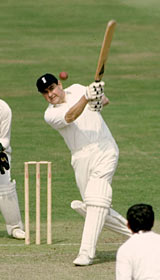Colin Cowdrey - the spirit of cricket
Hubert Doggart
|
|

|
Colin had been making slow but genuine progress after a stroke on July 30, and it came as a considerable shock, almost a reversal of nature, when a friend rang late on the evening of Monday, December 4, to tell us the bleak news about his serious heart attack and subsequent death. It was a death, at the relatively young age of 67, which impinged on a wide circle of friends, in England and overseas, as well as on his immediate family, who meant much to him. The obituaries and other articles that followed Colins death were understandably warm.
Although I had watched the end of his 116 against Cambridge in 1953, it was not until the 1954 season that I saw at close quarters the effortless strokeplay that became one of the hallmarks of his batting. He really did time the ball like an angel. We were opposing captains, he for Oxford and I for Sussex, on a grace term from Winchester College. I became immediately aware of his friendly authority and his innate devotion to the game, and we began a partnership and a friendship that lasted until his death. This included playing together in the 1959 and 1960 amateur rackets doubles competition. As you would expect, he was the ideal partner, always skilful, both in anticipation and in striking a rackets ball, always sporting and always unruffled at a time of crisis.
The first chance we had to work together in cricket was 1956, when we went in harness, he as captain and I as vice-captain, on what could fairly be called E. W. Swantons First Missionary Journey to the West Indies, the result of Jims disappointment at the tension that existed between the two Test teams on the MCC tour of 1953-54. Before we left, J. L. Manning, the Daily Mail sportswriter, imagined the manager and the players binding the Commonwealth together with Swantonian cement. I came to recognise, on that tour, the great binding gifts displayed by our captain.
This tour took place some 15 months after Colin had played, not many days past his 22nd birthday, what some observers thought his finest innings ever. In the New Year Test at Melbourne, England had lost four wickets quickly to Lindwall and Miller, and Colins riposte was a wonderful 102, out of a mere 191, with perfectly timed drives, both straight and to cover and skilful play off his legs. This remarkable innings helped prepare the way for the great feats of Englands bowlers in that Test and the next. Colin was the first player to appear in 100 Tests, and he captained England in 27, but sadly for him never in Australia, to which he made six tours. The last time, in the winter before he retired, he was summoned as a replacement at the age of 41, almost 42, to face Lillee and Thomson at the height of their ferocity.
Perhaps his happiest memories stemmed from his remarkable partnership at his beloved Kent, he as a successful captain from 1957 to 1971 with Leslie Ames as secretary/manager. In 1970, Kent won the Championship for the first time since 1913. He was, of course, delighted that two of his sons, Chris and Graham, followed him into the Kent side, Chris as captain from 1985 to 1990 and of England in one Test. Colin was Kents president at the time of his death and, whenever over the years unable to attend a match, would regularly check the Ceefax in his study to see how they were faring.
A great part of Colins engaging personality, which included a teasing sense of humour that could transform any exchange, was conditioned by a strict but sympathetic upbringing, his Christian faith, which developed over the years, and his belief that the old-fashioned virtues of the gentleman were of paramount importance. Thus he never spared himself in his service to cricket and to cricketers, and to those other bodies he served.
These included MCC and the ICC, for whom he travelled many thousands of miles on behalf of change, not least for South Africas return to Test cricket; The Lords Taverners, for whom, through regular visits to the regions and the evocative power of his speeches, he worked tirelessly as president for three years; the Skinners Company, of which he was master in 1985-86; the Association of Cricket Umpires, whose president he still was at his death; the Cricket at Arundel Castle, where the indoor cricket school will always be a memorial to him; and, near the end of his life, the House of Lords, to which John Major elevated him as a spokesman on sporting matters, and which he enjoyed to the hilt.
Two brief illustrations reflect his caring and meticulous approach to responsibility. The first concerns the invitation from the headmaster of Caldicott Preparatory School to be the first prize-giver of his tenure. Rare for a prize-giver, Colin insisted on going to Caldicott before the day to have a net, as cricketers say, and ensure that he would play an innings on prize-giving day as immaculate as that at Melbourne in 1954.
The second is his finding the time and the energy, when he had his own problems near the end of his life, to write to me, on my retirement as president of the English Schools Cricket Association, a precious note that thanked, applauded and encouraged. Such notes, like his timing of a cricket ball, were very much his hallmark, whether to those in authority or to those who had borne the heat of the day in a more humble role.
In simple truth, Colin Cowdrey was an exceptional person as well as an exceptional player, one who was both inspired by cricket and, through his idealism and his unashamed love for the game, an inspiration to young and old alike.
Hubert Doggart captained Cambridge University and Sussex, and in 1950 played twice for England.

